Trading Day: ASX surges, RBA holds, regulators hit Westpac, CBA
ASX 1.1pc higher after encouraging economic figures, as the RBA keeps rates unchanged and as Westpac and CBA face regulatory action.
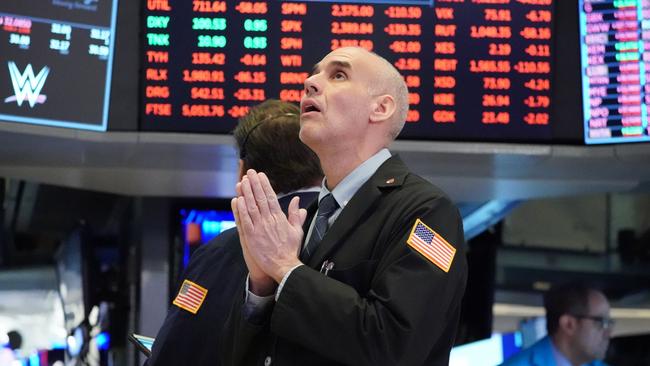
- China PMI at decade high
- Collins Foods lifts revenue, dividend
- Dow posts best month since 1987
- Bitcoin soars to new high
That’s all from the Trading Day blog for Tuesday, December 1. Australian stocks surged by as much as 1.4 per cent through the day and closed up by 1.1pc after promising economic figures. Earlier there were falls on Wall Street, where the Dow lost 0.9 per cent, the S&P500 shed 0.5 per cent and the Nasdaq edged 0.06 per cent lower. Locally, Australian Bureau of Statistics figures effectively confirmed an end to Australia’s technical recession. The Reserve Bank kept official rates on hold, as expected.
Ben Wilmot 7.56pm: Bunnings sale brings the big bucks
Two Australian corporate luminaries - corporate adviser Simon Mordant and board room legend David Gonski - have emerged as among the biggest beneficiaries of the switch to home delivery.
A Bunnings Warehouse their interests picked up in the inner Sydney suburb of Alexandria for about $16m in 2015 has just sold to an arm of the acquisitive Charter Hall empire for $70m.
The pair, alongside former Allianz Australian chairman John Curtis, are directors of South Central Sydney Pty Ltd, which bought up the property for $16m.
Mr Mordant is executive co-chairman of boutique investment advisory house Luminis Partners. Mr Mordant previously co-founded Caliburn Partnership, which was sold to Greenhill in 2010, and prior to that was head of corporate finance at BZW Australia and ABN AMRO.
He is better known for major corporate advisory roles and roles chairing the Museum of Contemporary Art and other major cultural bodies than commercial property investing.
Mr Gonski recently retired from ANZ’s board, having been a director for more than 11 years, originally serving between 2002 and 2007, and then returning as chair in 2014.
He is now poised for a new chairmanship at new outfit Barrenjoey Capital, adding to a network honed over decades in corporate boardrooms, including a long stint at Westfield Group.
Council documents show that some minor works were approved for the complex when they owned it but the real benefit came from buying at a time when the Bunnings lease appeared short and the industrial property boom was yet to kick into gear.
There is now a fierce war for sites that can be turned over to last mile delivery stations as more consumers switch online and once Bunnings shifts out in about four years the complex is likely to be repurposed.
Jared Lynch 7.34pm: Fix or fail at Freedom foods
The billionaire Perich family must be ruing the day chief executive Geoff Babidge left the company a decade ago to run a fledging dairy outfit, replacing him with their “strategic director” Rory Macleod.
Mr Babidge went out to create a market darling in A2 Milk, while Mr Macleod resigned from Freedom Foods in June after the board identified a series of accounting discrepancies, which it revealed on Monday had cost the company more than half a billion dollars in writedowns.
Freedom is now embarking on a $280m capital raising to repair its balance sheet, but analysts say a further capital injection will be needed early next year, fuelling investor fears of a “large dilutionary event in the future”.
Perry Williams 7.12pm: Santos sticks to gas
Santos plans to spend more than $1bn on its Narrabri project over the next five years and says it will remain a gas company for decades to come, eschewing a strategic shift by energy giants into renewables and electricity.
The South Australian producer has received federal and state approvals for the Narrabri coal-seam gas development in NSW and has now started a two-year appraisal process costing $US90m ($122m), drilling 10 gas wells ahead of a final investment decision in the first half of 2023.
It would then move on to a $US650m first-phase development spread over three years, reflecting a staged investment plan and less than a third of the original $3.6bn capital cost previously slated for the overall project.
Elise Shaw 6.53pm: Woolies appoints Helen McKenzie for food and grocery code compliance
Woolworths has appointed lawyer Helen McKenzie as its Code Arbiter in a newly created role under the recently strengthened Food and Grocery Code of Conduct (Code), which governs Woolworths Supermarkets’ dealings with its 5400 food and grocery suppliers.
Ms McKenzie will be responsible for dealing with complaints from suppliers about Woolworths’ compliance with the Code. Woolworths has been a voluntary signatory to the Code since 2015.
In the Code Arbiter role, Ms McKenzie will have authority to settle disputes relating to Woolworths’ obligations under the Code, develop and follow a new complaints handling procedure, and prepare annual reports that will be published and provided to the ACCC and government-appointed Independent Reviewer. Woolworths’ Code Arbiter replaces its Code Compliance Manager, who previously dealt with complaints.
Woolworths Group CEO Brad Banducci said: “As founding signatories, we’ve been strong advocates of the Food and Grocery Code of Conduct for many years.
“The Code provides a robust set of checks and balances and Graeme Samuel’s independent review found it has helped improve relationships between retailers and suppliers. The introduction of the independent Code Arbiter role for each signatory was a key recommendation from that review.
“The enhanced dispute resolution mechanisms in the Code are now among the strongest in the retail industry anywhere in the world and will provide additional assurances that suppliers can speak up safely and have commercial grievances resolved as objectively and expeditiously as possible.
“Helen McKenzie has a distinguished record in the law, including in dispute resolution, over many years and is well placed to fulfil this critically important role.”
James Kirby 6.24pm: Sweet spot for home prices
If there is going to be a sweet spot in the house price recovery this is it.
Prices are inching up across the country. Crucially, listing volumes have dropped and to top it off, the RBA is still saying it won’t change rates for three years.
Of course, as Commonwealth Bank economist Gareth Aird points out, at a certain point, the central bank will have to stop talking of “three years” for the simple reason time is passing since it first made this commitment a few months ago.
We won’t be hearing from the RBA on rates again until it meets again in February next year.
But another few months of this buoyant market and that promise of freezing rates for 36 months will need to be comprehensively reviewed.
In the meantime, a surprise house price upswing - greatly energised by government incentives - continues.
It might be riddled with exceptions - falling rental yields, unit price declines and wide regional variations - but the numbers speak for themselves.
Overall, dwelling prices rose in every city and region during November, even in Melbourne.
According to the CoreLogic research group, the average combined lift was 0.8 per cent. In turn, that means prices are now up by 1.1 per cent over the quarter, which is enough to confirm the national market is out of the woods.
Bridget Carter 5.32pm: Westpac sells insurance division to Allianz: sources
Westpac is understood to have sold its general insurance division to the world’s largest insurer, Allianz. for about $700m, according to sources.
The deal is expected to be announced to the market by Westpac this week and comes after both groups had been in exclusive talks in recent months.
Investment bank JPMorgan advised Westpac on the transaction.
Westpac and Allianz have a close relationship, with Allianz providing insurance products for the bank and some have suggested it may have had pre-emptive rights for at least some parts of the business.
The Westpac general insurance operations will likely strengthen the distribution channel for Allianz in Australia, where it is already a dominant player, and will offer the German insurer fire power to take on local groups such as Suncorp and IAG in personal insurance .
Allianz has operated in Australia for some time, buying the Manufacturers Mutual Insurance business in 2000 and it provides a wide variety of insurance products, ranging from industrial risk to professional indemnity.
The price paid is right in line with the predictions of experts around the market, which earlier suggested that Westpac would likely receive a price of about $700m for the operation.
Westpac was always anticipated to get on the front foot when it came to selling the business, given that rival CBA was also expected to put its general insurance operation on the market, which is considered superior to the Westpac offering.
It is understood that CBA is likely to move forward with its sale next year, and most estimate that business will sell for about $1bn.
Likely contenders include IAG, Suncorp, QBE and Zurich.
Elise Shaw 5.25pm: Coles appoints Jeff Kennett for food and grocery code compliance
Coles has appointed former Victorian Premier the Hon. Jeff Kennett, AC, to oversee compliance with the Food and Grocery Code of Conduct, as part of an industry-wide rollout of the independent dispute resolution model pioneered by Coles in the Australian market.
The appointment builds on the role Mr Kennett has played as an independent arbiter under Coles’ Supplier Charter since 2014, under which unresolved disputes between Coles and suppliers could be escalated to Mr Kennett for investigation, with Coles bound by any resulting decisions including payment of up to $5 million.
Coles was the first Australian supermarket retailer to adopt this independent arbitration process to help resolve commercial disputes, and was also instrumental in the creation of the Food and Grocery Conduct, becoming a foundation signatory in 2015.
In an independent review of the Code, former ACCC Chairman Graham Samuel said in 2018 that Coles’ independent arbitration process had been praised by suppliers for its “focus on obtaining a remedy for the supplier, with binding decisions on Coles for payment of compensation or changes to the supplier’s contracts,”* and recommended the Code be amended to require all signatories to implement a similar process^.
The Federal Government accepted the recommendation and has now amended the Code to require all signatories to appoint an independent arbiter and grant them authority to enter into agreements with suppliers to settle disputes relating to the Code up to $5 million.
Coles Group Chief Commercial Officer Greg Davis said the work Mr Kennett had done as independent arbiter for Coles since 2014 had been instrumental in transforming Coles’ relationships with suppliers.
“We’re committed to dealing fairly with our thousands of suppliers, and in cases where we haven’t been able to resolve issues internally, our suppliers know that Jeff is there as a fair, independent and confidential point of escalation who will sort things out,” he said.
Mr Kennett said the adoption of the independent arbitration model was a step forward for the entire supermarket sector and its relationships with suppliers.
“I thank Coles and the Australian Government for putting in place a non-legalistic system that Coles has had in place for a number of years now, that can quickly and confidentially deal with, and in the vast majority of cases resolve, disputes between suppliers and supermarkets,” he said.
“The past five years of working with Coles has established that this process not only works, but it can lead to substantial changes in the way a supermarket deals with its suppliers. Given that so many of the suppliers to supermarkets are small in size, a commonsense approach in evaluating and resolving any dispute is to be welcomed.”
David Swan 5.00pm: Investors push Bitcoin to new record
Virtual currency bitcoin has soared to a new high, heading towards $US20,000 ($27, per coin as debate continues to rage over the digital asset’s true value and utility.
Bitcoin was as low as $US5450 in March when global markets plummeted due to Covid-19, but has since tripled in value with payment giants PayPal and Square now allowing their customers to buy and sell the cryptocurrency. In the early days of the global financial crisis, it traded at just a few cents per coin.
Tuesday saw Bitcoin rise about 8 per cent, taking its yearly rise past 150 per cent, according to data from Bloomberg.
Professor Saurav Dutta, the Head of the School of Accounting at Curtin University, said demand for bitcoins had skyrocketed due to the likes of PayPal, US investors and hedge funds diversifying their investment portfolio.
“Within weeks of venturing into Bitcoin market, PayPal is purchasing over 70 per cent of new bitcoins being mined, leading to an increase in prices,” he told The Australian.
“PayPal is the biggest tech firm to accelerate its move into the cryptocurrency space. Its wallet holders can now buy, sell and hold cryptocurrencies like bitcoin, ethereum, bitcoin cash and litecoin. Robinhood started trading in digital currency in 2018, while Square has been involved since 2019.”
4.35pm: ASX higher after cash rate call
The local sharemarket began December with a strong push forward as the nation’s balance of payments results was confirmed by the RBA to indicate that “economic recovery is underway.”
The benchmark S&P/ASX 200 Index lifted 70.70 points, or 1.1 per cent, to close at 6588.5 points after pushing past the 6600 barrier to an intraday high of 6613.5 in the afternoon, shortly before the RBA confirmed it would maintain a 0.1 per cent cash rate.
All sectors booked a gain with tech leading the way, up 1.92 per cent, followed by consumer discretionary and materials up 1.69 per cent and 1.32 per cent respectively.
Even energy, slightly rocked by OPEC+’s decision to delay whether to maintain oil production cuts, booked 0.06 per cent positive growth. Brent Crude fell slightly during trading by 0.68 per cent to $US47.57 a barrel.
Food stocks that benefited during the lockdown outperformed today, with Domino’s Pizza leaping 12.36 per cent after analyst upgrades while Collins Foods, operator of KFC, jumped 10.91 per cent after it increased its interim dividend.
Sandfire Resources closed up 9.82 per cent after saying it plans to open a copper-silver mine in Botswana at a time when copper prices are trading near eight-year highs, with the copper spot price trading at $US7569.25 on the London Metals Exchange at the market’s end.
Energy stocks were the worst performing, with Viva Energy down 3.10 per cent and Cooper Energy down 2.78 per cent.
Treasury Wine Estates continued to slide, closing down 2.21 per cent for the day. It has shed 18.13 per cent of its value in the past five trading sessions.
Despite strong economic indicators, the Australian dollar was only slightly stronger against the US dollar at US73.66c at market close.
Elise Shaw 3.37pm: CBA ‘optimistic’ on economy, low rates
Commonwealth Bank’s Global Markets Research team has an “optimistic view” on the economic outlook and notes “the Australian economy will be on a sufficiently entrenched path of improvement by the middle of next year that the RBA will need to either remove or increase the target yield on the 3-year Australia Commonwealth Government Bond (ACGB)”.
“For as long as the target on the 3-year ACGB sits at the same level as the cash rate, the RBA is implying that the cash rate will remain on hold for the next three years.
“The middle of next year is still some time away, but it is worth considering now how these dynamics are likely to playout given our views on the outlook for the Australian economy.
“There is no RBA Board meeting in January which means that the next RBA Board meeting is not until 2 February 2021.”
The team said: “In 2021, we expect household credit growth to step up a little (CBA (f) 4%/yr). But in a broad sense household credit growth will still be constrained.
“While we expect record low interest rates to drive new lending and house prices higher, we believe the majority of households will use the lower rates to accelerate debt repayment.
“As such, rising home prices and a lift in new lending do not pose a risk to financial stability next year. By extension we do not think dynamics in the housing market will have any impact on RBA monetary policy decisions in 2021.
2.43pm: Bitcoin posts new record
Cryptocurrency Bitcoin has briefly surpassed a record high and is close to puncturing $US20,000 per unit.
Overnight the cryptocurrency soared past its previous record of $US19,783 to reach $US19,800, before falling back to $US19559.70.
The currency has seen a gain in excess of 150 per cent since March, when it traded at about $US5000, and its December futures are already trading above the $US20,000 threshold.
The digital currency has increased 40 per cent since October when Paypal said it would integrate cryptocurrency support into its payment platform.
Adam Creighton 2.31pm: RBA ends dramatic year with a hold
The Reserve Bank board has kept what remains of its powder dry in the final meeting of a year that witnessed the most dramatic loosening of monetary policy on record.
After the final board meeting of the year Governor Philip Lowe said the range of new policies unveiled in November, including $100bn bond buying program, appeared to be working for now.
Dr Lowe said the RBA would not lift the cash rate until consumer price inflation, which was 0.7 per cent over the year to September, was back above 2 per cent and wage growth had risen significantly.
The board cut the cash rate to 0.1 per cent in November and also reduced the interest rate banks pay to borrow from the Reserve Bank to 0.1 per cent.
The meeting ahead of the board’s two-month summer break, came a day ahead of the release of the national accounts for the third quarter of the year.
Those accounts are widely expected to show the economy grew over the three months to the end of the September, formally bringing to an end the recession, often defined as two consecutive quarters of economic contraction.
2.18pm: ASX200 extends gains, up 1.4pc
The local sharemarket is set to finish the first trading day of the month with a solid gain, as it rose 1.37 per cent by early afternoon after balance of payments data signalled an increase in economic growth.
Food stocks that prospered over the long months of lockdown are doing well today, with Domino’s Pizza up 12.42 per cent following analyst upgrades and KFC operator Collins Goods up 11.34 per cent on the back of a steady half-year profit and increased dividend.
Sandfire Resources was up 10.96 per cent after it announced plans to develop a new copper mine in Botswana as the commodity spot price closed just under seven-year highs at $US7569.25 a tonne.
IDP Education was down 2.74 per cent, the foremost underperformer, while Treasury Wine Estates saw a further deterioration in its share price, down 1.40 per cent today and 17.84 per cent over the past five.
Platinum Asset Management fell off its more than two week winning streak, falling 1.44 per cent after Morningstar cut its recommendation to sell this morning.
ZIP Co was trading down 1.49 per cent while Afterpay was up 3.14 per cent, helping the tech index gain 2.07 per cent.
Eli Greenblat 2.15pm: Asahi Australia’s Margin retires
Asahi Beverages, which last year bought Carlton & United Breweries for $16 billion, has announced the retirement of Peter Margin as chairman of Asahi Holdings Australia.
The Japanese multinational brewer and drinks giant said Mr Margin had decided that now is the right time to retire as chairman of AHA, following the successful integration of Carlton & United Breweries into the Asahi Beverages business in June this year.
“It has been an immense privilege and an incredibly professionally rewarding experience to see Asahi Beverages’ unparalleled growth and success over the past five years, as well as complete Asahi Beverages’ succession planning,” Mr Margin said.
“I will now be concentrating on my other board directorships.”
Roland van Bommel, acting chairman of AHA, paid tribute to Mr Margin. “Peter has been an exceptional leader of AHA. He can be very proud of the company’s strong growth over the past five years.
“He leaves the Asahi Beverages business in great shape.”
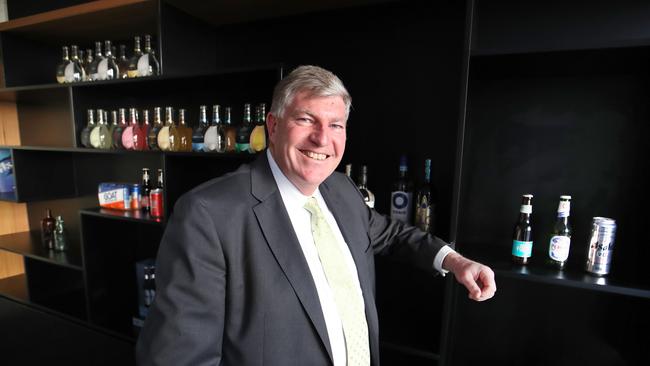
1.24pm: China PMI at decade high
A private gauge of China’s manufacturing activity hit its highest level in a decade in November thanks to firm demand from domestic and overseas markets, signalling a robust manufacturing recovery in the world’s second-largest economy as it rebounds from the pandemic.
The Caixin China purchasing managers index, which is weighted toward small, private manufacturers, rose to 54.9 in November from 53.6 in October, Caixin Media Co. and research firm Markit said Tuesday.
November’s reading marked the seventh consecutive month that the Caixin PMI held above the 50 mark separating contraction from expansion.
Purchasing activities, overall sales, inventories and employment all grew at their steepest rates in near a decade, Caixin said.
“More and more surveyed enterprises began adding staff to meet strong market demand,” Wang Zhe, a senior economist at Caixin Insight Group, said in a statement accompanying the data. The employment subindex stayed in expansionary territory for a third straight month and hit its highest level since May 2011.
China’s official manufacturing PMI, focused more on large, state-owned companies, climbed to its highest level in three years at 52.1 in November from 51.4 in October, according to data released by the National Bureau of Statistics on Monday. The official survey of manufacturers has a much larger sample than the private survey.
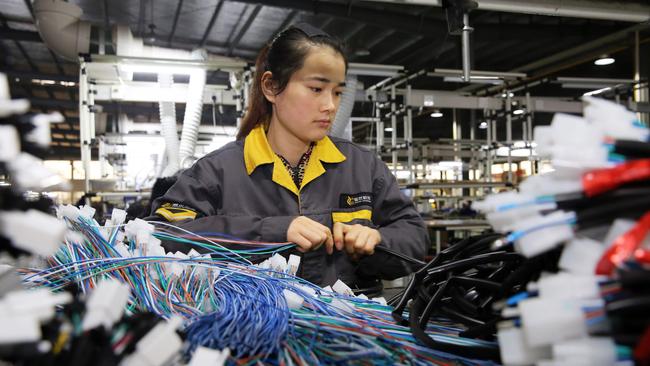
Dow Jones Newswires
Nick Evans 1.05pm: Pilbara buys collapsed firm’s lithium mine
Pilbara Minerals says it has closed a deal to buy the lithium mine of collapsed neighbour Altura Minerals, saying the company’s receivers had agreed to a sale of Altura’s operating entities.
Altura collapsed at the end of October after the company’s lenders lost patience with long running attempts to recapitalise the company, with Pilbara immediately stepping in with a $US175mm offer for its assets, enough to pay out the company’s lenders.
Pilbara Minerals said on Tuesday it is putting together a $240m capital raising to back the acquisition, ahead of a December 11 vote of Altura’s creditors to approve the deal.
Under the agreement, Pilbara Minerals will acquire Altura’s operating subsidiary that owns the mine and the processing plant, with the lending group already having agreed to vote in favour of the offer when a deed of company arrangement is put to lenders at a meeting likely to be held in early December.
If the DOCA is not approved by the meeting, Pilbara said it had reached an alternative accommodation with Altura’s lenders to directly acquire the assets from receivers KordaMentha.
Altura was nearing the launch of a $200m raising, led by Canaccord Genuity and Perth’s Azure Capital, when Altura’s lending group — including Castlelake, CarVal, Nomura and Clearwater Capital — called in KordaMentha as receivers, appointing voluntary administrators at the same time.
Patrick Commins 12.49pm: Figures point to recession’s end
The final two pieces of the GDP puzzle for the September quarter have dropped, with economists tipping the economy rebounded strongly from the COVID-19 recession.
Balance of payments data from the ABS showed a jump in imports as the economy reopened and supply chains restarted sent the current account surplus down 40 per cent to $10bn, with border closures and Chinese trade restrictions dragging on the country’s export performance.
Net exports will detract 2 percentage points from real GDP growth over the three months to September, BIS Oxford Economics chief economist Sarah Hunter said.
“Despite this and the lockdown in Victoria, the economy almost certainly expanded, with consumer spending able to rebound sharply as a result of the relaxation of restrictions and control of the disease,” Ms Hunter said.
“Indeed today’s data confirms the anticipated strength in private consumption – imports of consumer goods rose 13.1 per cent on the quarter in volume terms.”
The ABS also released public spending figures showing public expenses exceeded revenues by an extraordinary $93.6bn over the quarter as the Morrison government continued to pump money into the economy - a key driver for what is expected to be a very strong rebound in consumption after the June quarter lockdowns.
Economists will finalise their forecasts for real GDP growth today, with Westpac already flagging it expects tomorrow’s national accounts will show the economy expanded by 3 per cent after collapsing by 7 per cent in the June quarter.
12.35pm: Loan deferrals plunge in October
October saw a steep fall in loan deferrals, with APRA figures showing that there were $88bn loans on pause in October, down 51 per cent from $179bn the previous month, Credit Suisse analysts noted.
Small and medium business loan deferrals fell the most, down 59 per cent, while home loan deferrals fell 49 per cent.
Across the major banks, ANZ saw a 44 per cent decrease in total deferrals to $16.5bn, its highest month of exits. Commonwealth Bank had a 51 per cent reduction in their balance of total deferrals to $21bn, predominantly due to lower SME deferrals.
NAB saw the largest decline in deferrals, dropping 67 per cent to just over $14bn while Westpac had a 21 per cent decline in total deferrals to $19.059bn.
12.25pm: Stocks surge to midday
The ASX200 overcame an uncertain start to be over 1.2 per cent higher after midday, ahead of the Reserve Bank announcement, after encouraging economic figures.
Shortly before 12.30pm, the index was up 1.24 per cent to 6598 points.
At 11.30pm (AEDT) Australian Bureau of Statistics figures effectively signalled an end to the technical recession, ahead of official GDP figures tomorrow, while housing approvals surged and payroll figures pointed to Victoria’s recovery.
All sector indexes flipped into positive territory with the exception of the energy index, down a reduced 0.21 per cent as OPEC+ pondered whether to maintain oil production cuts, and as Brent crude fell 0.23 per cent to $US47.82 a barrel.
The tech index led, up 1.71 per cent following a small 0.1 per cent gain on the tech-heavy Nasdaq overnight, with Afterpay up 2.36 per cent.
Domino’s Pizza was still the best performer in the ASX200, lifting 11.04 per cent following an upgrade from analysts, while Sandfire was a close second, up 10.96 per cent, following the news it would develop a new copper mine in Botswana, and shortly after copper prices hit seven-year highs.
Polynovo was up 6.23 per cent and Breville was up 5.36 per cent after Macquarie raised it to outperform.
IDP Education was the worst performer, down 3.72 per cent and followed by Unibail-Rodamco-Westfield, down 2.39 per cent.
Bega Cheese was knocked off its perch to become the third worst performer, down 2.19 per cent.
Santos was up 0.73 per cent following its upgrade of it’s production guidance while Zip Co fell 0.91 per cent.
12.18pm: Bank of America ‘no’ to Arctic drilling
Bank of America said that it would not finance oil and gas drilling projects in the Arctic, the latest large US bank to take the step long sought by environmental advocates.
A Bank of America spokesman confirmed the decision after it was initially reported by Bloomberg.
Environmental protection organization the Sierra Club welcomed the news. “Goldman Sachs, Morgan Stanley, Chase, Wells Fargo and Citi have all announced similar policies this year,” the NGO said in a statement.
“Bank of America has faced mounting pressure in recent months from indigenous communities, environmental advocates and shareholders to follow suit.”
The decision comes after outgoing US President Donald Trump’s administration in mid-November launched the formal process of selling oil drilling leases in the Arctic National Wildlife Refuge in the US state of Alaska.
The refuge is home to a number of protected animal species, including polar bears and caribou.
AFP
Patrick Commins 12.14pm: Payroll figures point to Victoria recovery
Four times as many employee jobs were added in Victoria than nationally over the two weeks to November 14, the latest evidence of a revival in the state’s fortunes following the successful suppression of its second wave of COVID-19 cases.
The ABS data draw on payroll figures from the ATO’s single-touch payroll system, and capture around 80 per cent of the labour market.
Payroll jobs climbed by 0.4 per cent in Victoria over the fortnight to mid-November, the data show, and by 0.1 per cent nationally.
Payroll jobs have lifted for three fortnights in a row, pointing to a continued labour market recovery after official labour force statistics showed a solid lift in employment in October and added to hopes that unemployment has peaked at around its current level of 7 per cent.
That said, the recovery remains incomplete: the ABS data show payroll jobs remain 2.9 per cent lower than before the pandemic, and 5.4 per cent lower in Victoria.
Hospitality and arts sector workers remain the hardest hit by the recession. Despite regaining around three in five payroll jobs lost since March, there are still 6 per cent fewer food and accommodation jobs and almost 12 per cent fewer arts roles. In Victoria, those deficits stretch to around 20 per cent.
Lilly Vitorovich 12.04pm: Fletcher fires ‘please explain’ to ABC
Communications Minister Paul Fletcher is demanding answers from the ABC board over the public broadcaster’s Four Corners program, which alleged affairs by government ministers Christian Porter and Alan Tudge.
Mr Fletcher has written to ABC chair Ita Buttrose about the Four Corners episode, called “Inside the Canberra Bubble”, which was aired on November 9.
In his letter, which was published on his Twitter account on Tuesday morning, he notes the public broadcaster’s Code of Practice, and demands answers to 15 questions.
“Why does the board consider it is appropriate that the privacy of the Attorney General and Minister Tudge (the Ministers) should be compromised by the way in which the program details extensively with aspects of their personal lives?”
Patrick Commins 12.02pm: Housing approvals surge
More houses were approved to be built in October than in any month since 2000, new ABS data has revealed, as easing COVID-19 restrictions, record low interest rates, a resurgent property market and government incentives supercharged demand to build new homes.
The number of dwelling approvals - including houses and apartments - lifted 3.8 per cent to 16,584 in October versus the month before, according to the seasonally adjusted figures. Approvals are now up by a third versus a low of 12,459 recorded in June around the height of the COVID-19 disruptions, and are 14 per cent higher than a year before.
Detached house approvals increased 3.1 per cent to 10,692 to hit a 20-year high, and are up 32 per cent against October 2019.
The number of apartment approvals lifted by 6.2 per cent in the month to 5529, but remained 10.6 per cent lower than a year before.
ABS director of construction statistics Daniel Rossi said “the continued strong demand for detached housing follows the relaxation of COVID-19 restrictions in most states and territories”.
“Record low interest rates and a range of federal and state-based incentives are also providing support for the housing sector,” Mr Rossi said.
Joyce Moullakis 11.47am: CBA facing action over incorrect rates
Commonwealth Bank faces Federal Court action by the corporate regulator, alleging it breached the law more than 12,000 times by slugging customers with incorrect interest rates on overdrafts.
In a statement on Tuesday, the Australian Securities and Investments Commission said it had launched civil penalty proceedings in the Federal Court against CBA.
The matter - which also relates to a case study heard during the Hayne royal commission - has ASIC alleging the bank charged a rate of interest on business overdraft accounts “substantially higher” than what its customers were advised. The documents show that often CBA was charging customers more than double what they should be levied.
ASIC says that from 1 December 2014 to 31 March 2018, within the six-year limitation period for court action, CBA engaged in conduct that contravened financial services laws.
It alleges that on 12,119 occasions CBA made misleading representations, failed to comply with its legal obligations and engaged in misleading or deceptive conduct, contravening relevant laws.
ASIC is seeking declarations, pecuniary penalties and other orders against CBA, although the date for the first case management hearing is yet to be scheduled by the court.
CBA said in a statement that it did not intende to defend the proceedings, but had addressed the errors and refunded 2,269 customers a total of $3.74m.
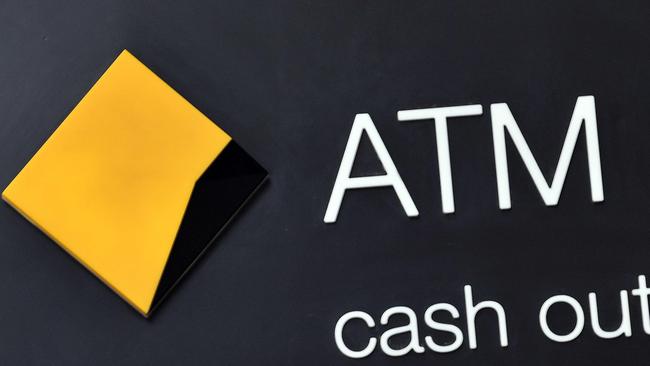
Ben Wilmot 11.35am: Charter Hall swoops on Bunnings site
Last mile logistics is driving more property deals, with the Charter Hall-managed Core Logistics Partnership buying a Bunnings warehouse in inner Sydney’s Alexandria.
The property at 520-530 Gardeners Road in the prime South Sydney precinct traded for $70m via an off-market acquisition brokered by Joshua Charles of One Commercial.
The 1.9ha site in the tightly-held Alexandria industrial and logistics precinct will spin off an income for the remaining lease term of four years but then will likely be redeveloped.
A Bunnings Warehouse store has been on the site for 20 years. However Charter Hall has negotiated a surrender package with Bunnings, which no longer needs the facility.
Paul Garvey 11.30am: WA to open its borders
Western Australia’s hard border with Victoria and NSW will finally come down on December 8, opening the door for families across the country to reunite in time for Christmas.
WA premier Mark McGowan announced on Tuesday morning that arrivals from Australia’s two most populous states would no longer need to go into quarantine for two weeks.
Victoria officially eliminated coronavirus last week, while NSW is on track to achieve the same milestone by Saturday.
11.29am: Humm proposes JV with Douugh
Buy now pay later company Flexigroup, recently renamed Humm, has proposed a joint venture with the Douugh neobank to enter the competitive US BNPL market.
The BNPL venture will carry the Douugh branding and will use Humm’s technology platform to manage a line of credit up to $US1000 to allow customers to meet urgent expenses and pay them back over six weekly instalments.
Humm will make a strategic investment of $2.5m as part of Douugh’s capital raise to support the development.
Greg Brown 11.22am: Canavan fires up energy war
Nationals senator Matt Canavan has reignited the energy wars within the Coalition as he called on Scott Morrison to tear up its energy agreement with the NSW government and instead build a coal-fired power station in the Hunter Valley.
The Queensland senator lashed out at the Berejiklian government’s energy roadmap, which passed state parliament last week and encourages investment in low emissions energy to replace ageing coal-fired power stations.
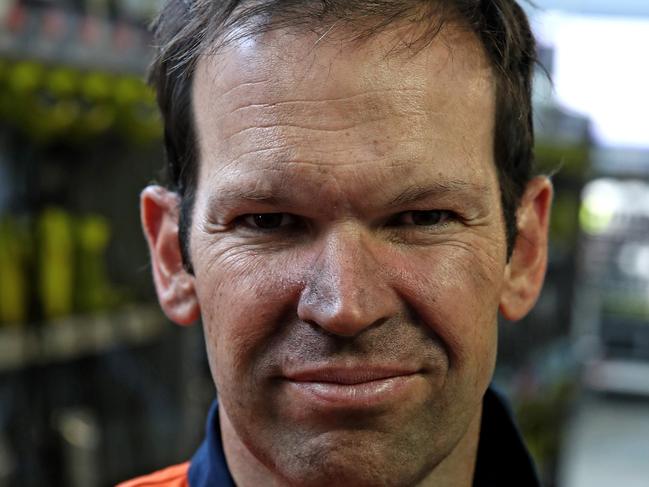
Senator Canavan accused NSW of passing “radical legislation” without consulting the federal government. He said the policy undermined the Morrison government’s program to underwrite new energy projects, with gas projects being put on hold.
Senator Canavan questioned why rural people would have to be kept up at night by “noisy wind farms just so guilt-ridden inner-city people can sleep”.
The former resources minister said the government needed to tear up its $2bn energy agreement struck in January and instead built a new coal-fired power station in the Hunter Valley.
Partyroom sources say Senator Canavan was supported by Nationals MP Barnaby Joyce and Liberal MP Craig Kelly.
11.17am: ASX recovers from uncertain start
The S&P ASX200 was 0.7 per cent higher in late morning trade after earlier veering between red and green.
A short time ago the index was 0.71pc higher at 6563 points.
11.13am: BetMakers enters US with Sportstech buy
BetMakers Technology Group has announced a $50m fully underwritten placement to fund the acquisition of Sportstech’s racing and digital assets in the US, UK and Europe for $56.2m.
The offer price will be $0.60 cents a share, representing a 9.1 per cent discount on the last close price of $0.66 and will result in the issuance of 83.3 million new shares, 13.9 per cent of the current shares on issue.
The remainder of the acquisition will be funded by cash on hand.
BetMakers’ managing director Todd Buckingham said the move would help the company achieve its plans for growth.
“This acquisition will supercharge our entry into the US and position the company for substantial growth on the back of the emerging wagering opportunities in US racing, including fixed odds, where we believe we are well placed,” he said.
“The acquisition would give us a meaningful presence in the US, including in 36 of the states and across more than 200 venues, 25 digital outlets and 9,000 betting terminals.
“It will also greatly expand our global customer base across the UK, Europe and Asia and provides us with an opportunity to expand our product offering at scale in these and other regions.”
11.11am: Klarna takes on Afterpay, Zip
Citi analysts believe the Commonwealth Bank-backed Klarna is challenging the growth prospects of Afterpay and Zip in the US and UK.
In the US Klarna has seen total US customers hit 11 million and added a number of merchant partners in recent months.
Accordingly, the analysts say there is no justification for Afterpay to trade any higher at its 28x enterprise value/revenue multiple due to upside risks emanating from a competitive US buy now, pay later marketplace.
They believe Afterpay should look at opening up its US network by adding a “curated shop anywhere” offering to loyalty members.
Elsewhere, Zip Co faces downside risks to its medium term growth and margins due to competition in the UK, where Klarna is the market leader and LayBuy and OpenPay have a head start.
“While Zip’s global presence is a differentiator compared to some of the smaller players and UK represents a large addressable market, given the lack of an early mover advantage, Zip may need to spend more on marketing (incl. co-marketing) to grow in the UK,” the analysts said.
11.08am: Tesla to enter S&P 500 at full weight
S&P Dow Jones Indices said it will add Tesla’s full weight to the S&P 500 all at once in December, shedding more light on a mammoth addition that has captivated investors across Wall Street.
The index company said Tesla will be added to the broad stock-market gauge before the start of trading December 21, meaning most index-tracking funds that follow the S&P 500 will engage in a flurry of trading the Friday before.
Tesla’s market value has ballooned to about $US538 billion, making it the sixth largest company in the U.S. stock market and it would have more than a 1 per cent weighting in the S&P 500. That puts it ahead of Berkshire Hathaway Inc. but behind Facebook Inc.
More than $US100 billion will be put into motion in coming weeks as passive fund managers and some actively traded mutual funds all benchmarked to the S&P 500 adjust their portfolios to make room for it, traders and fund managers say.
Weaving Tesla into the S&P 500 means shifting weightings of many other stocks to include the electric-vehicle maker. The addition also comes near the end of a year already marked by huge price swings during the coronavirus pandemic.
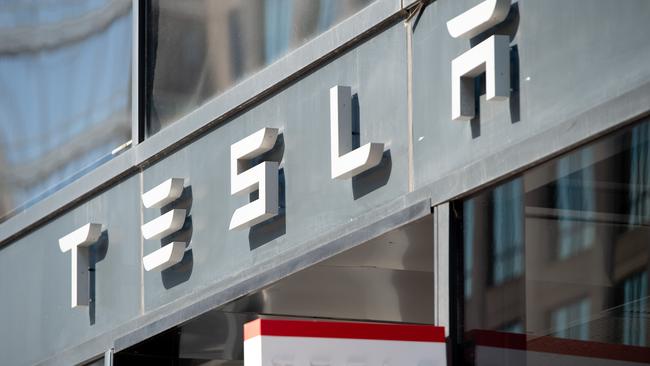
Dow Jones
Joyce Moullakis 10.39am: New regulatory blow for Westpac
The banking regulator has hit Westpac with enforcement action for “material breaches” of a standard on liquidity, forcing independent reviews and a more onerous calculation of its ratio.
The action is yet another blow to Westpac after it agreed to pay a record $1.3bn penalty to financial crimes regulator Austrac for millions of breaches of the law.
On Tuesday, the Australian Prudential Regulation Authority announced the enforcement action against Westpac in relation to the breaches, which were identified during 2019 and 2020.
APRA said they related to the incorrect treatment of specific funding and loan product for calculating the Westpac’s Liquidity Coverage Ratio (LCR) and Net Stable Funding Ratio (NSFR).
“While the breaches have been rectified, and do not raise concerns about the overall soundness of Westpac’s current liquidity position, APRA believes they demonstrate weaknesses in risk management and oversight, risk control frameworks and risk culture,” the statement said.
APRA is requiring a tougher calculation of the LCR and “comprehensive reviews” by independent third parties of Westpac’s compliance with liquidity reporting requirements and the fixing of its control framework for liquidity risk management.
“Until the findings from the independent reviews are addressed to APRA’s satisfaction, APRA will also require Westpac to apply a 10 per cent add-on to the net cash outflow component of its LCR calculation,” the regulator said.
Westpac is expected to provide a broad response to the APRA action in an ASX statement.
APRA deputy chair John Lonsdale said under the liquidity requirements, banks had to maintain “a sound liquidity risk management framework” to ensure accurate calculation of the LCR and NSFR.
10.20am: ASX fades after early lift
The local sharemarket opened slightly higher following a record-breaking November but soon faded to flat.
In the opening minutes the S&P ASX200 lifted 9.7 points, or 0.15 per cent to 6527.6 points, but dropped back to hover around the flatline.
It came after declines on Wall Street, where the Dow racked up its best month since 1987, and falls in Europe.
Moving the market this morning was the healthcare index, up 1.91 per cent following the news that Moderna has plans to apply for US and EU emergency authorisation of its COVID-19 vaccine.
Following it was the tech index, up 0.88 per cent, while the energy index fell 1.28 per cent as OPEC+ met to discuss whether to delay a planned output decrease. Brent oil fell 0.71 per cent to $US47.88 a barrel.
Domino’s Pizza was the best performer of the morning, jumping 12.02 per cent after Macquarie analysts raised it to neutral on the back of a new buy recommendation from Goldman Sachs.
Sandfire Resources lifted 7.76 per cent as the company unveiled plans for a new copper-silver mine in Botswana, and as copper hit a seven-year high overnight, closing on $US7700 a tonne.
Collins Foods jumped 7.59 per cent as strong KFC sales helped the company boost its interim dividend by 10.5 per cent, while Elders lifted 5.44 per cent after Citi initiated coverage with a buy.
Gold miners rebounded as the gold spot price lifted to $US1776.98/OZ.
Whitehaven Coal continued its downwards trajectory as trade and political tensions with China remained high, falling 4.91 per cent, while IDP Education fell 3.39 per cent and Woodside fell 2.46 per cent after being cut to hold by Shaw and Partners.
A slew of stocks exposed to COVID-19 risks fell in early trading: Unibail-Rodamco-Westfield fell 3.19 per cent, Corporate Travel Management fell 3.10 per cent, Webjet fell 2.69 per cent and Flight Centre fell 2.57 per cent.
10.15am: Collins Foods lifts revenue, dividend
Collins Foods, which operates KFC and Taco Bell restaurants, has seen half year revenue lift and announced a larger interim dividend, despite the decision to close the Sizzler Brand in Australia.
Overall revenue was up 11.3 per cent to $448.8m driven primarily by KFC Australia, which saw revenue increase by 15.6 per cent to $415.5m and underlying EBITDA lift 22.4 per cent to $77.2m.
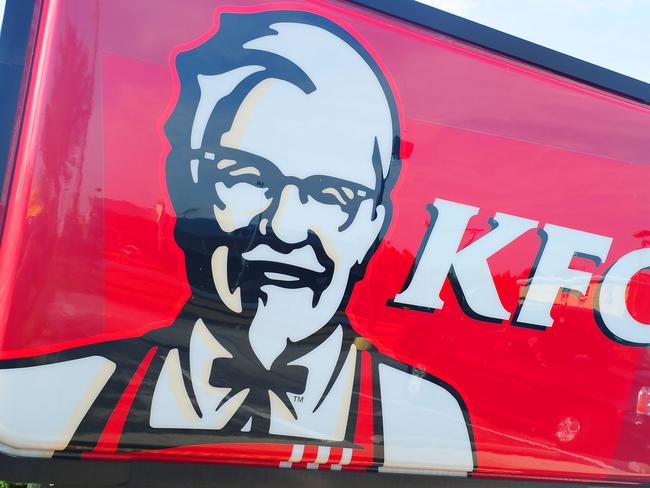
Statutory net profit after tax slid slightly from $20.4m last year to $16.5m as KFC Europe sales declined. Sizzler same-store sales fell by 50.7 per cent and the rollout of Taco Bell in Australia slowed.
The company reduced net debt to $170.7m from $217.3m and paid an interim dividend of 10.5 cents a share, up 10.5 per cent.
10.15am: Options confirmed for Kogan
Kogan founder Ruslan Kogan has received 3.6 million options from the company while CFO David Shafer has received 2.4 million following approval for the move at Kogan’s AGM last month.
The options have an exercise price of $5.29.
Kogan last traded at $16.40 a share.
10.13am: Adore upgrades guidance
Newly-listed cosmetics company Adore Beauty has upgraded guidance for the first half of the financial year following a strong black Friday and cyber weekend trading period.
Forecast revenue has been lifted 7 per cent to $95.2m and is “anticipated to have a positive e impact on the EBITDA forecast for 1H FY21F.”
The company said the extension of the COVID-19 lockdown in Victoria also contributed to the results.
Half year results will be released to the market in February.
9.53am: Vocation settles class action
Collapsed education and trading provider Vocation Limited has reached a $50m settlement over a class action brought against the company and its auditors, PWC.
The action alleged that PWC was liable for misleading shareholders by making incorrect statements about their audit of the company while the Victorian government was investigating Vocation, which later led to the cancellation of government contracts at the collapse of the company into liquidation in late 2014.
It also alleged that Vocation made misleading or deceptive statements during its IPO and its former directors and officers made misleading statements about the company after it went public.
The settlement was made on behalf of people who acquired Vocation shares between November 27 and December 4, 2014 and is currently before the courts for approval.
Slater and Gordon was funded by Omni Bridgeway to bring forward the action.
9.40am: What’s impressing analysts?
Elders Limited initiated at buy at Citi
Domino’s Pizza upgraded to neutral at Macquarie, raised to buy at Goldman Sachs
Treasury Wine Estates downgraded to neutral at UBS; cut to underweight at JP Morgan
GPT Group cut to neutral at Credit Suisse
GUD Holdings raised to hold at Morningstar
Oil Search cut to hold at Shaw and Partners
Platinum Asset Management cut to sell at Morningstar
Santos cut to hold at Shaw and Partners
Woodside cut to hold at Shaw and Partners
9.30am: Exxon to write down assets by up to $US20bn
Exxon Mobil said it will write down as much as $US20 billion in assets as the oil giant slashes capital spending due to low oil prices amid the coronavirus pandemic.
ExxonMobil, which has reported losses the last three quarters, said it will account for a $US17- $US20 billion write-down in the fourth quarter based on shifting assets from the United States, Canada and Argentina out of its development plan.
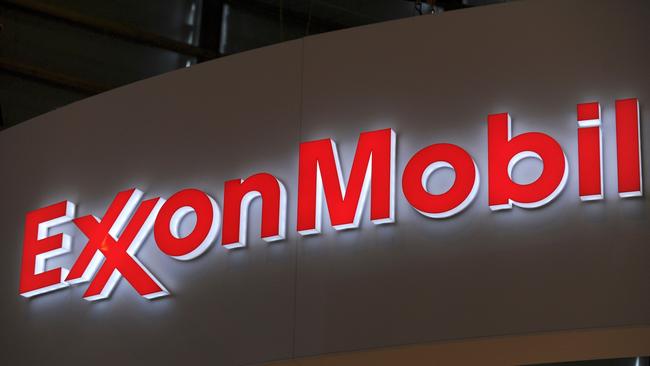
AFP
9.27am: UK retailer Arcadia in administration
British clothing retail group and Topshop owner Arcadia, ravaged by coronavirus lockdowns and fierce online competition, has gone into administration.
The group, which is comprised of eight of the UK’s best known high-street and fashion retail brands and owned by controversial businessman Philip Green, will be administered by the consultancy firm Deloitte, according to a press release.
The decision throws into uncertainty 13,000 jobs at the company’s flagship stores including Topshop, Topman, Dorothy Perkins, Burton, Miss Selfridge, Evans and Wallis.
However, Deloitte has specified that there are no layoffs on the horizon and that trading will continue with a reopening of outlets this week as England emerges from a four-week coronavirus lockdown.
AFP
Ben Wilmot 9.17am: Lendlease ups stake in Sydney towers
Sydney’s office skyscrapers are holding up against the coronavirus crisis, with Lendlease’s Australian Prime Property Fund Commercial swooping on an additional one quarter interest in 1 Farrer Place in the CBD.
Listed property giant GPT put the stake in the complex, which includes the landmark Governor Phillip and Governor Macquarie Towers, on the block last month.
The entire complex is worth about $2.4bn and the sale was keenly watched as it shows premium office values are holding as landlords attempt to entice workers back to their desks.
It is the largest building complex to be put in play since the pandemic hit, although China’s sovereign wealth fund has already swooped on a half interest in Grosvenor Place in a $925m play.
Buying the stake from GPT took the Lendlease fund’s total holding to 50 per cent and the deal was struck at a headline price of $584.6m.
One of Australia’s most iconic office tower complexes, 1 Farrer Place is located in the heart of Sydney’s financial, legal and commercial district. APPF Commercial has held a one quarter interest in the asset since 2003, with Dexus holding a 50 per cent stake.
During COVID-19, 1 Farrer Place’s high-calibre and diverse tenant mix has maintained above-market physical occupancy levels, demonstrating the asset’s resilience and strong underlying value.
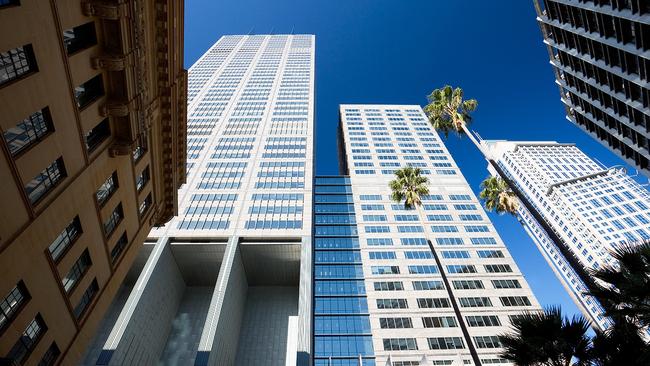
9.13am: Ovato to raise $40m
Magazine printing and distribution business Ovato has launched an entitlement offer to raise about $40m, with up to $35m conditionally underwritten by a major shareholder and customer.
It said 10.93 new fully paid ordinary shares will be offered to existing shareholders at five cents each for every one share they currently hold.
The company said the funds would be used alongside a newly-acquired $17m debt facility to exit “onerous leases”, on operational initiatives, the cash banking of remaining bank guarantees, headcount rationalisation, repayment on overdraft facility, payment of transaction fees and the availability of new balance sheet working capital liquidity.
Ovato’s pro-forma net debt after raising will be $44.6m including specific “onerous lease liabilities” and $37.8m without them.
The Hannan family, a 53.8 per cent shareholder, will provide $25m in conditional sub-underwriting while Are Media - formerly known as Bauer - will provide $10m subject to Foreign Investment Review Board Approval.
If the conditional sub-underwriting is approved by both parties and $40m raised, the Hannan family’s interest will increase to 61.8 per cent and Are Media would receive a 22.9 per cent interest in the company.
9.10am: ASX to dip at the open
Australian stocks are set to edge lower in early trade, as Wall Street fell amid profit-taking but the Dow posted its best month since 1987.
Around 9.00am (AEDT), the SPI futures index was down 11 points.
Yesterday, the benchmark S&P/ASX 200 index closed lower but posted its best month on record.
The Reserve Bank board holds its last meeting of the year today, but is expected to hold its cash rate at a historic low of 0.1 per cent, and to maintain its $100 billion quantitative easing program.
The Australian dollar is lower at US73.50c.
Brent oil was down 1.2 per cent at $US47.59 a barrel. Spot iron ore was 1.0 per cent lower at $US132.30 a tonne.
9.05am: Cromwell boss discussion ‘natural’
Cromwell Property has not denied media speculation that CEO Paul Weightman is due to depart the business.
Respon ding to media reports, CRomwell told the ASX: “Mr Weightman has been executive chair or CEO since 1998 and succession planning has been an issue on the Cromwell board’s agenda for some time now.
“The board believes it is best practice to always consider what comes next and, given his tenure of 22 years, natural for his position to be a matter for regular and ongoing discussion between Mr Weightman and the board.”

8.48am: Fed unlocked $US2 trillion: Powell
Federal Reserve Chairman Jerome Powell said the central bank’s actions to backstop a range of credit markets after the coronavirus convulsed Wall Street this past spring had unlocked almost $US2 trillion to support businesses, cities and states.
In testimony prepared for delivery at a congressional hearing later today (AEDT), Mr Powell said the Fed’s unprecedented steps to stabilize financial markets had largely succeeded in restoring the flow of credit from private lenders.
Treasury Secretary Steven Mnuchin on November 19 told Mr. Powell that he would not grant extensions for five lending programs that have backstopped markets for corporate and municipal debt and to purchase loans made to small businesses and nonprofits when those programs expire on December 31.
Mr. Powell didn’t elaborate in his testimony, released overnight, about the central bank’s disagreement with Mr. Mnuchin’s decision. The Fed had earlier said it would have preferred the lending programs had stayed open because the pandemic emergency hasn’t receded.
Mr. Mnuchin is slated to testify alongside Mr. Powell at tonight’s hearing and didn’t address the conflict in his prepared testimony.

Dow Jones
8.40am: AUB buys 360 Underwriting
Insurance provider AUB Group has acquired 360 Underwriting Solutions for $127m through an upfront payment of $25m and shares in the new entity.
360 Underwriting Solutions comprises ten underwriting agencies and will form part of the restructure of AUB Group’s restructure of its underwriting agencies division.
AUB Group CEO and managing director Mike Emmett said: “360 Underwriting Solutions is highly regarded for its underwriting expertise and insurance servicing capabilities in the Australian market.
“They have a strong presence across SME general insurance and enjoy a leading position in key market segments.
“The acquisition is aligned to the group’s disciplined approach to M&A in acquiring businesses that accelerate our portfolio scale and growth, whilst adding to our core capabilities.”
Nick Evans 8.38am: Sandfire tick for Botswana mine
Sandfire Resources has given the green light to a new $US259m copper mine in Botswana, saying the development will secure the company’s future as it looks to expand beyond its ageing DeGrussa operations in Western Australia.
The copper miner released the results of its final feasibility study on the T3 project in Africa, bought through the $167m takeover of MOD Resources in 2019, saying it plans to build a mine capable of producing an average 30,000 tonnes of copper and 1.2 million ounces of silver over a 12.5 year mine life.
Sandfire’s decision comes as copper hit a seven year high overnight, closing on $US7700 a tonne in London trading, its highest levels since March 2013 on the back of strong manufacturing figures from China.
The company said it was also running studies over an option to build a bigger plant at the mine, as it looks to an expanded production base from regional drilling that could lead to construction of a hub of mines around its initial operations in Botswana.
The company had $304m in cash at the end of September and is looking to transition its DeGrussa processing plant into a gold mill as the rich copper-gold deposit runs to the end of its life.
Sandfire shares closed Monday at $4.38.
8.19am: Dow falls, but posts best month since 1987
US stocks slipped but held on to hefty gains for the month, capping a furious November rally fuelled by investors’ bets that scientists are closer than ever to finalizing Covid-19 vaccines to fight the pandemic.
The market’s momentum faded on the final trading day of November, with the Dow Jones Industrial Average falling 266 points, or 0.9 per cent, to 29643 as of the close of trade.
The S&P500 fell 0.46 per cent and the Nasdaq ended 0.06 per cent lower.
But even with Monday’s slide, stocks ended the month with historic gains. The blue-chip average was up nearly 12 per cent for the month, its biggest gain since January 1987. The S&P 500 finished November with a 10.8 per cent gain and the Nasdaq Composite was up 11.8 per cent for the month.
With officials in the US looking close to approving the distribution of multiple vaccines, many money managers are betting on the economy being able to recover lost activity over the next year. Signs that President-elect Joe Biden will make a relatively smooth transition into the White House have also helped ease some of the political uncertainty that had fed into heightened market volatility in the fall.
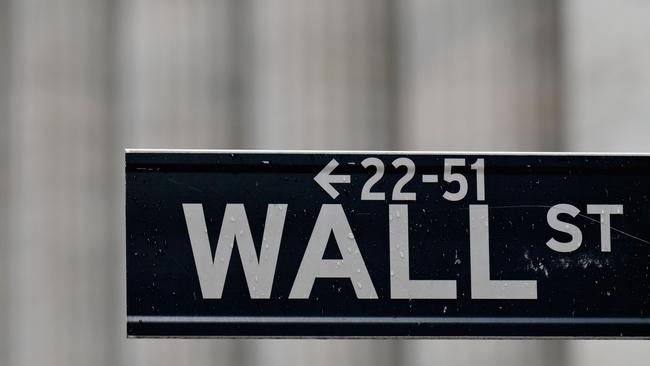
In a sign of investors’ optimism, shares of companies that had suffered most from the pandemic, such as energy producers and banks, have posted steep gains. The Russell 2000 index of small-cap stocks is on pace for its best month since its 1984 inception.
Monday’s stock slide shows the market rally isn’t immune to setbacks. Surging coronavirus infections in the U.S. and the possibility for logistical hiccups in the distribution of the shots could lead to further bouts of selling. And some investors wonder what will fuel stocks higher from here, now that big question marks, like the elections and the likelihood of a successful vaccine, appear to be in the rearview mirror.
In Asia, investors were rattled by a Reuters report that the Trump administration is poised to add oil producer Cnooc and chip maker Semiconductor Manufacturing International to a blacklist of alleged Chinese military companies. Cnooc shares tumbled 14pc in Hong Kong, while SMIC’s Hong Kong-listed stock fell 2.7pc.
Most major markets in the region ended lower. Hong Kong’s Hang Seng lost 2.1pc, Japan’s Nikkei 225 retreated 0.8pc and the Shanghai Composite Index lost 0.5pc.
Dow Jones Newswires
8.12am: Santos upgrades production guidance
Santos has raised its annual production guidance and said it was targeting lower costs following a strong operating performance in 2020 so far.
Santos said it now expected to produce between 87m and 89 million barrels of oil equivalent, from 83m to 88m, and lowered its production cost guidance to $8-$8.5/barrel of oil equivalent.
It came as Santos announced an ambitious roadmap to net zero emissions.
The company attributed the guidance upgrade to “strong operating performance across the base business,” and noted that the upgrade represents 15-18 per cent production growth for the year and more than 50 per cent growth since 2015.
Cost reductions announced in March in response to COVID-19 are also on track to be delivered, with capex still forecast at $900m, in line with the previously stated 38 per cent reduction.
Additionally, integration of the ConocoPhillips acquisition was progressing well, with synergies gleaned from the deal upgraded to $90-105m per annum.
The newly-unveiled net zero by 2040 target will involve reducing emissions in line with the Paris Agreement, with a 26-30 per cent reduction in scope one and scope two emissions by 2030 largely through carbon capture.
“Our focus over the last three years on step change technologies such as carbon capture and storage has enabled a pathway that allows us to go further faster when it comes to emissions reduction, managing director and CEO Kevin Gallagher said.
The company also said that the Barossa project with Darwin LNG has taken another step towards a final investment decision, with tolling agreements to transport and process gas through DLNG approved.
7.38am: Adelaide casino restrictions eased
SkyCity Entertainment says coronavirus restrictions have eased at its casino in Adelaide, as it opens expanded facilities.
It says from today, its Adelaide casino and entertainment facilities are no longer subject to a 100 person limit per venue.
However restrictions remaining include an initial 1000-person limit for the Adelaide gaming floor.
SkyCity also says that from today, its Adelaide expansion will open in stages.
New gaming areas will open to members on December 2 and to the public on December 3 while a new luxury hotel, bar and restaurants will open today.
The District at SkyCity, a new entertainment venue, will open on December 3.
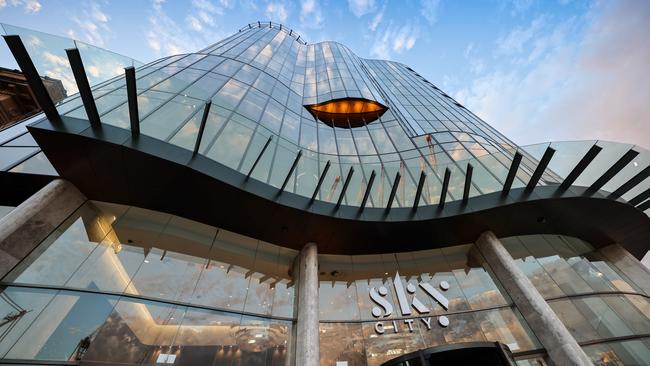
7.35am: NZ Sky Network CEO quits
Satellite TV and streaming company Sky Network Television said its chief executive Martin Stewart has resigned after less than two years in the role.
Mr. Stewart will be replaced by Sophie Moloney, currently a senior executive at Sky, and will help with the change of leadership for the next three months, the New Zealand company said.
Mr Stewart said the likelihood of continued border restrictions in New Zealand because of the pandemic had contributed to his decision to return to Europe.
Dow Jones Newswires
5.30am: Dow falls, but on track for best month since 1987
US stocks slipped but held on to hefty gains for the month, capping off a furious November rally fuelled by investors’ bets that scientists are closer than ever to finalising COVID-19 vaccines to fight the pandemic.
The market’s momentum faded on the final trading day of November, with the Dow Jones Industrial Average falling 340 points, or 1.1 per cent, in early afternoon trade. The S&P 500 lost 0.7 per cent and the Nasdaq shed 0.45 per cent.
Even with Monday’s slide, stocks remain on track for historic gains. The blue-chip average is up nearly 12 per cent for the month, which would mark its biggest gain since January 1987. The S&P 500 is headed for a 10 per cent gain and the Nasdaq Composite is up 11 per cent for the month.
With officials in the U.S. looking close to approving the distribution of multiple vaccines, many money managers are betting on the economy being able to recover lost activity over the next year. Signs that President-elect Joe Biden will make a relatively smooth transition into the White House have also helped ease some of the political uncertainty that had fed into heightened market volatility in the fall.
In a sign of investors’ optimism, shares of companies that had suffered most from the pandemic, such as energy producers and banks, have posted steep gains. The Russell 2000 index of small-cap stocks is on pace for its best month since its 1984 inception.
Monday’s stock slide shows the market rally isn’t immune to setbacks. Surging coronavirus infections in the US and the possibility for logistical hiccups in the distribution of the shots could lead to further bouts of selling. And some investors wonder what will fuel stocks higher from here, now that big question marks, like the elections and the likelihood of a successful vaccine, appear to be in the rearview mirror.
Still, many strategists expect that investors will ultimately view any declines as a buying opportunity.
“We’ve got a lot of very good vaccine news,” said Daniel Morris, chief market strategist at BNP Paribas Asset Management. “We should, for the most part, move up between now and the end of the year, with a chance for a setback here or there.
Shares of drugmaker Moderna jumped 16 per cent after saying it would ask US and European health regulators to authorise use of the company’s COVID-19 vaccine.
Most Asian markets ended lower. Hong Kong’s Hang Seng lost 2.1 per cent, Japan’s Nikkei 225 retreated 0.8 per cent and the Shanghai Composite Index lost 0.5 per cent.
Dow Jones Newswires
5.20am: Moderna to ask FDA to authorise vaccine
Moderna said it will ask US and European health regulators to authorise use of the company’s COVID-19 vaccine, after it was shown to be 94.1 per cent effective in a full analysis of a pivotal study.
The timing keeps the vaccine on track to become possibly the second to go into use in the US by year’s end -- after one already under regulatory review from Pfizer and BioNTech -- with inoculation available to the general public likely in spring or summer.
In the 30,000-person trial, 196 subjects developed COVID-19 with symptoms after receiving either the vaccine or a placebo, Moderna said. Of those, 185 had taken a placebo, while only 11 had gotten the vaccine, indicating it protects against the disease.
Moderna also said the vaccine appeared to be generally safe, though some subjects developed headaches and other mild to moderate reactions.
“I think this vaccine is going to be really a game changer for this pandemic,” Moderna Chief Executive Stéphane Bancel said in an interview. “We think it can really prevent severe disease.”
If the U.S. Food and Drug Administration clears the shot, distribution could start within weeks. Moderna expects a panel of outside experts advising the FDA to meet Dec. 17 to review the evidence for the company’s vaccine and vote on whether to recommend that the agency authorise its emergency use.
A similar meeting has been set for December 10 for the Pfizer-BioNTech vaccine.
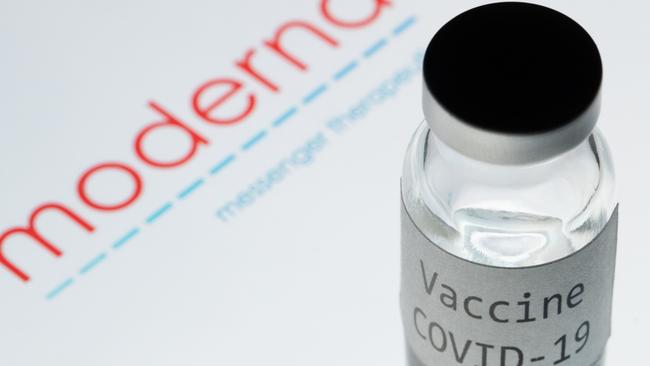
Dow Jones
5.15am: Facebook to acquire Kustomer
Facebook said it would buy Kustomer, a start-up that specialises in customer-service platforms and chatbots, part of an effort by the social-media giant to help companies use its platforms to do business.
Facebook announced the deal in a posting. Though terms weren’t disclosed, people familiar with the matter said it would value New York-based Kustomer at a little over $US1 billion.
Closely held Kustomer, whose technology takes conversations from different channels and puts them on a single screen, was valued at $US710 million in a private funding round roughly a year ago, according to PitchBook.
Increasingly, customers are communicating with companies by messaging instead of calling. Every day, more than 175 million people reach out to businesses using WhatsApp, Facebook said in the posting.
Kustomer already has a relationship with Facebook. Its offerings allow companies to aggregate and respond to customer inquiries that come in through Facebook Messenger. In October, Kustomer said it also began integrating with Facebook’s Instagram messaging.
Dow Jones
5.10am: Stocks slip as infections overshadow vaccine hopes
Global equity markets fell back as hopes that vaccines will soon be rolled out were overshadowed by concerns over fears of a coming surge in US cases.
Oil prices remained under pressure going into a two-day meeting of major producers, traders concerned at the lack of an agreement on an extension of the output cuts that have provided support for most of the year.
World markets have surged this month thanks to breakthroughs on vaccines, while investors have also been cheered by Joe Biden’s US presidential election win and signs that incumbent Donald Trump will allow a smooth transfer, despite claims of voter fraud.
But Wall Street lost steam after recent record highs as the Dow gave up some 1.2 per cent two hours into trading, with London and Paris seeing similar losses at the European close.
Frankfurt’s DAX, having enjoyed a 15 per cent rise on vaccine optimism across the month, limited its fall to 0.3 per cent.
With at least three vaccines in the pipeline and approval in some countries said to be just weeks away, there is optimism on trading floors as dealers forecast an economic rebound next year.
Indications that a surge in new infections in Europe looks to be slowing were also providing some hope, as Britain and France prepare to ease some of their lockdown restrictions.
However, Trump’s top infectious diseases expert warned of a fresh jump in cases in the coming weeks after millions of Americans ignored scientific advice and travelled around the country for Thanksgiving.
Oil traders are awaiting a meeting of OPEC and other major producers that starts Monday, hoping they agree to continue their output cuts for another few months as the global economy stutters. However, observers said there was concern that so far there had been no sign they would do so.
AFP
5.05am: Bitcoin on record tear towards $US20,000
Top virtual currency bitcoin briefly soared to a new high, heading towards $US20,000 per unit.
The currency soared past its previous high of $US19,783 to hit $US19,800 with some sector analysts forecasting it will soon breach the $US20,000 resistance point.
Debate has raged over the status of the digital asset, launched in late 2008, as to whether it should be seen as a form of money, an asset or a commodity.
Monday saw it rise some 8 per cent, taking its yearly rise past 150 per cent, according to data compiled by Bloomberg, a far cry from the few cents it traded at in its early days which followed on the heels of the global financial crash.
In March it stood at just $US5,000.
The unit, which regularly sees its value suffer wild swings, had slipped back to $US19,380 by mid afternoon, for a day rise of 6.5 per cent, leaving its total market capitalisation at around $US360 billion.
AFP
5.00am: Arcadia rejects emergency loan offer
British clothing retail group Arcadia, ravaged by coronavirus lockdowns and fierce online competition, has rejected an emergency loan offer, even as it teeters on the brink of bankruptcy.
Some 13,000 jobs are at risk at the company’s flagship stores including Topshop, Topman, Dorothy Perkins, Burton, Miss Selfridge, Evans and Wallis.
British media reported the group was poised to enter administration, in what would be another body blow to Arcadia boss Philip Green and the Covid-hit British retail sector.
Green, 68, who was once dubbed “the king of the high street”, saw his reputation hit from the high-profile collapse of retailer BHS four years ago.
His bricks and mortar businesses has also suffered from increasing online competition from the likes of Boohoo and Asos.
But Arcadia turned down a £50-million ($US67 million) loan from British sportswear tycoon Mike Ashley’s Frasers Group to stave off bankruptcy.
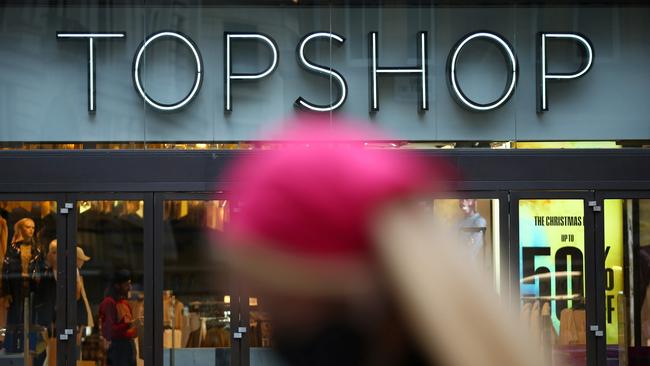
AFP
4.58am: OPEC begins meeting
As the coronavirus pandemic continues to weigh on global oil demand, the OPEC oil producers’ club began a meeting in which they are expected to decide on an extension of production cuts.
“2020 continues to be a year of immense challenges caused by the COVID-19 pandemic,” Abdelmadjid Attar, who currently holds the rotating presidency of the Organisation of the Petroleum Exporting Countries (OPEC) and is also Algeria’s energy minister, said in a speech broadcast live at the beginning of the group’s videoconference meeting.
The common goal of the 13 member states, who will be joined by Russia and other allies forming the OPEC+ grouping on Tuesday, is to keep afloat a crude market devastated by the COVID-19 pandemic and which is slowly recovering from the depths into which prices plunged at the end of April.
That month, OPEC members agreed to cut production by 7.7 million barrels per day (bpd), which was meant to be eased to 5.8 million bpd in January 2021.
However, most observers expect the cut instead to be extended by three to six months to take into account the ongoing effects of the virus.
AFP
4.55am: Biden formally taps Yellen as Treasury secretary
US President-elect Joe Biden has selected former Federal Reserve chair Janet Yellen as his choice for Treasury secretary.
“Janet Yellen is nominated to serve as Secretary of the Treasury. If confirmed, she will be the first woman to lead the Treasury Department in its 231-year history,” Biden’s transition team said in a statement.
The 74-year-old previously broke barriers as the first female Fed chief, and will be tasked with revitalising the coronavirus-stricken US economy if confirmed by the Senate.
Biden announced Yellen’s nomination -- which was first reported last week -- along with a number of other officials who would fill out his administration’s economic team once he takes office in late January.
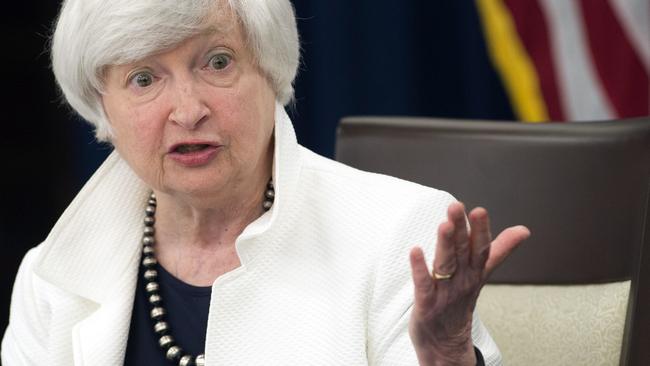
AFP
4.50am: Fed extends emergency lending programs
The Federal Reserve said it has extended several pandemic emergency lending programs through March 31, with approval from the US Treasury Department.
The announcement marked an about face after Treasury Secretary Steven Mnuchin last week said the programs should be allowed to lapse as planned on December 31.
The Fed protested the decision in a rare public statement, saying the programs provided an important “backstop for our still-strained and vulnerable economy.”
AFP
4.45am: S&P Global gobbles up IHS Markit
Ratings giant S&P Global said it had agreed to an all-stock merger with IHS Markit that values the data and analysis firm at $US44 billion.
“Through this exciting combination, we are able to better serve our markets and customers by creating new value and insights,” said Douglas Peterson, the chief executive of S&P Global and who will serve as CEO of the combined company.
S&P is best known for its ratings business, while IHS Markit for its purchasing manager surveys that are an advance indicator of economic activity, as well as its military and security information subsidiary Jane’s Information Group.
“This merger increases scale while rounding out our combined capabilities, and accelerates and amplifies our ability to deliver customers the essential intelligence needed to make decisions with conviction,” Peterson said.
The merger will create a $US126-billion financial services behemoth that will be headquartered in New York.
S&P shareholders will own nearly 68 per cent of the new company, while shareholders in UK-headquartered IHS Markit will own the rest.
The firms said they expect the merger to generate some $US680 million in synergies by the end of the fifth full year after closing, which is expected in the second half of next year.
They said the merger should be positive for earnings by the end of the second year after closing.
AFP
4.40am: Unilever becomes wholly British
Consumer goods giant Unilever said it has become a wholly British company, completing a historic merger of its Dutch and British corporate entities to end its double-headed structure.
The new group, Unilever PLC, will now be headquartered in London under a so-called unification strategy designed to make it more responsive to economic challenges including coronavirus.
Unilever, which has experienced strong demand for hand cleaners and household cleaning products during the deadly COVID-19 pandemic, insisted there will be no change to its operations, locations, activities and staffing levels.
“Unilever is pleased to announce the completion of the unification of its group legal structure under a single parent company, Unilever PLC,” it said in a statement.
“From today, and for the first time in its history, Unilever now trades with one market capitalisation, one class of shares and one global pool of liquidity, whilst also maintaining the group’s listings on the Amsterdam, London and New York stock exchanges.”
Shareholders had overwhelmingly approved the move in September after the group had unveiled the plan in June.
The company’s Dutch corporate entity Unilever NV had ceased to exist on Sunday, it added.
The company’s food and refreshments division will continue to be based in Rotterdam. Britain will continue to be the base for both its home care and its beauty and personal care units.
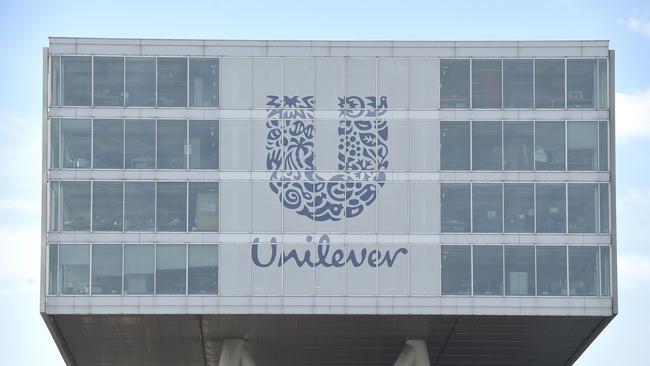
AFP



To join the conversation, please log in. Don't have an account? Register
Join the conversation, you are commenting as Logout